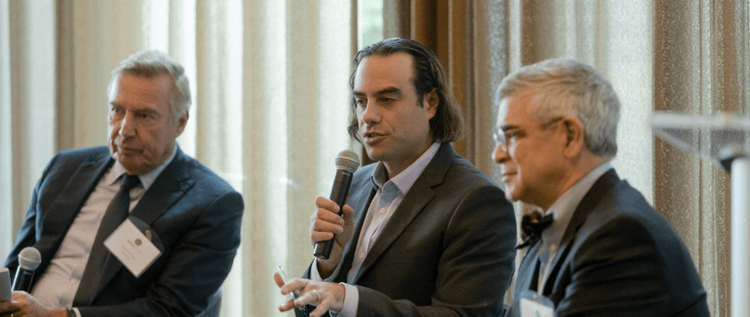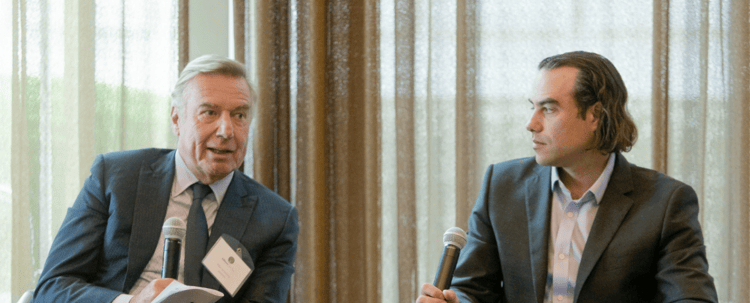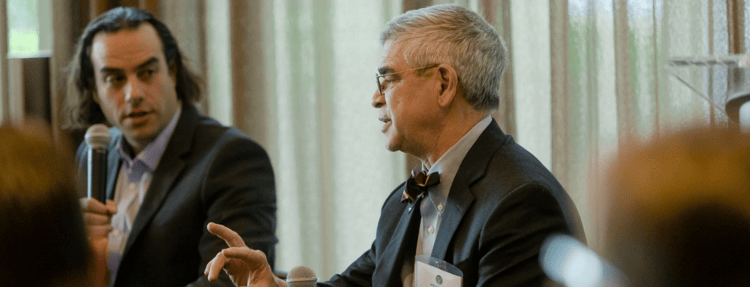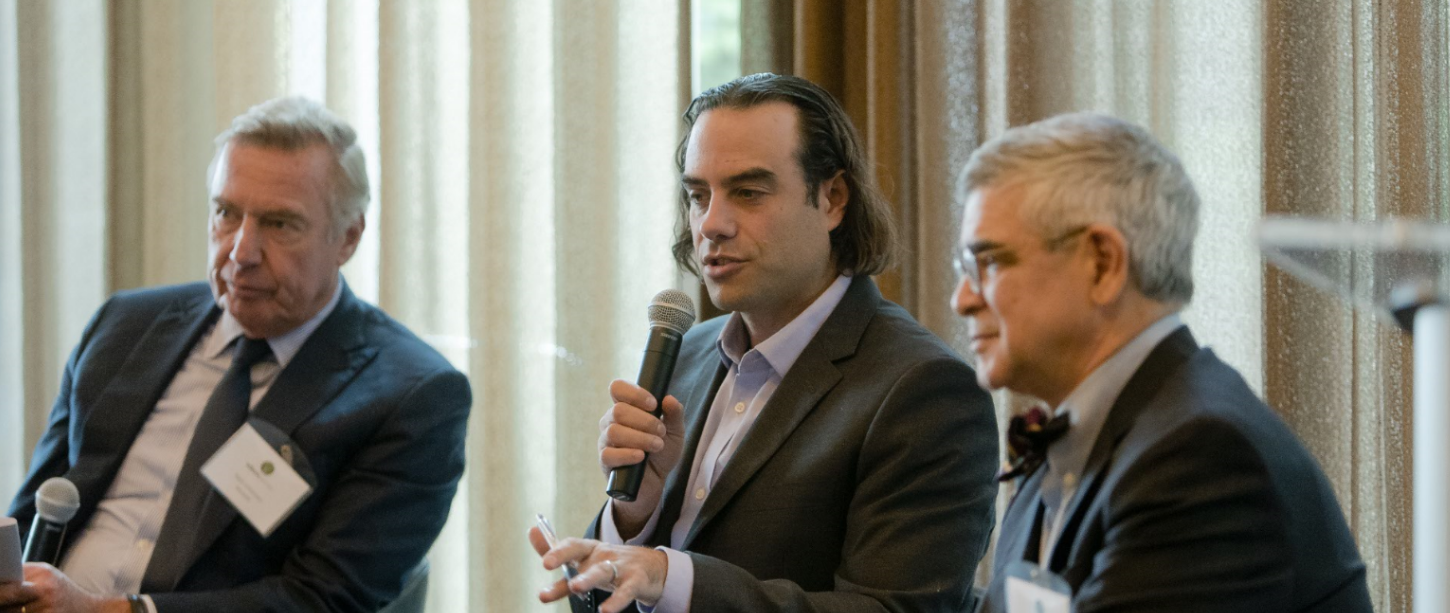Edison recently held its 30th Annual Meeting with many of our LPs, CEOs, independent directors, and friends of the firm in attendance. Given the upcoming election, this year’s Annual Meeting chair, Kelly Ford Buckley, decided to cook up something special for everyone: a lunchtime debate on the economic implications of the presidential election.
Edison was proud to host Evercore President & CEO, Ralph Scholsstein (speaking from the Left) and former Chief Economist of the U.S. International Trade Commission, Professor Peter Morici (speaking from the Right), in a lunchtime debate moderated by Senior Editor of Fortune and Author of Term Sheet, Dan Primack.
The debate, while concise and lively, primarily focused on a handful of topics of relevance to the Edison family in attendance. Following are six take-aways from the heated debate. Mary issues discussed briefly touch on where the Clinton and Trump “camps” each stand.

1. General Tax Philosophy
To kick things off, Dan asked Ralph and Peter to each touch on the general tax philosophies of their respective nominees.
|
It’s hard to ignore the fact that Trump has been reasonably clear about what he would do about Tax cuts, absent of how he would do it. Hillary’s priorities have also been quite clear, such as infrastructure spending, but we’re likely going to have a fairly substantial infrastructure spending regardless of who wins.
Hillary has mentioned a higher tax on incomes above $1M and $5M and increasing the estate tax from 45% to 65%. However, the likelihood that any of these changes are ultimately enacted is low.
|
With Trump, we’re probably looking at a Reagan-style tax cut with flatter structure, less deductions, and more simplicity overall. It’s extremely difficult to have a tax cut that’s politically palatable and it’s tough to have one at all since the country is growing so slowly. With Trump, Peter expects to see a very moderate tax cut paid for by programs that Trump would be forced to accept. Peter likened Trump’s campaign to Obama’s ’08 campaign: not much of a plan and many generalizations; saying he would be the second outsider in a row. On the subject of personal income tax, Peter pointed to a Green Room that stated how the U.S. could have a 60% personal income tax at the highest levels, and it wouldn’t affect productivity…”if that’s true, I’ll be playing shortstop for the Mets next year.”
|
There was pretty wide agreement on both sides that each candidate’s plan has little chance of ever being implemented, and that what is said during a campaign is very disconnected from what can actually fly and get through the House in Washington.
2. Corporate Income Tax
Dan pointed out that Trump has suggested a 15% corporate tax rate, but Hillary hasn’t said anything. Will there be corporate tax reform no matter who is elected?
|
Ralph believes there is pretty close consensus between Democrats and Republicans in congress that the corporate income tax has to be lowered to keep the U.S. competitive. Hillary hasn’t spoken much to this issue, but he could see her pushing for something as low as 25% or the 28% that Obama has proposed previously.
|
In Peter’s mind, Clinton has to be aware of what’s going on in Europe and how they’re cutting corporate taxes. No matter who’s elected, we’ll be competing against countries such as Great Britain and Ireland, whose corporate income tax policies are far more favorable, to recruit major corporations.
|
3. Carried Interest
Of course, most of the audience had interest in the future of carried interest and what, if anything, will happen. Both candidates have said it should change to ordinary income tax and that they will change it and Obama campaigned on this issue. "Is this change actually going to happen or is it just campaign talk?"
|
Ralph believes that a change, should it ever make it to the floor, would probably be able to get through the House. However, everyone wants that to come as part of a larger tax reform package and that’s what makes this so difficult.
Both Ralph and Peter agreed that if carried interest ever gets taken away, it’d be near impossible to get back. |
Peter alluded to a “golden moment” that Obama had to change this when he had a 60-vote majority to pass Obamacare and we needed a source of revenue at the time. Carried interest reform could have been that source, but Obama went after investment income that doesn’t pay the social security tax instead. That being said, Peter wasn’t sure if the revenue increase would have been enough to cover the costs, and called out that Obama and Clinton take in way too much money from people who don’t want carried interest to go away, so they’ll never actually be able to do anything about it.
|

4. Deductibility of Interest on Corporate Income Tax
Dan called attention to Trump calling for the status quo to stay in place (100% deduction), but that Obama had previously suggested that it should be reduced, but never suggested a particular number. “Do you think that reducing the deductibility will be up for discussion at some point or is it off the table entirely?”
|
Ralph candidly stated that he doesn’t know Hillary’s position and that she probably hasn’t taken one. However, Ralph elaborated for Hillary a bit and doubted that she would ever actually push forward with an effort to reduce deductibility. He believes that removing or reducing the deductibility of corporate income tax wouldn’t just raise the cost of debt capital, but it would have a negative effect on equity markets, and it would hurt multiples. Ralph pointed to the efficiency and liquidity of our capital markets as one of our greatest competitive advantages and anything that could hamper that is probably bad policy. Further, access to capital in the US isn’t just a public markets phenomenon; “the supply of private venture money from people like Edison, doesn’t exist in other countries.”
|
Peter doesn’t think this should ever be up for discussion, that any change is simply bad economics. One of the more interesting points of the day came when Peter described present day America as a period of American capitalism akin to that of just before the civil war, pointing out that all of the great things that happened in that era were from small companies creating the Industrial Revolution and reaping those benefits for the American economy. Bridging that back to the present, he pointed out how we constantly ask ourselves "why IBM isn’t doing that? Well, they aren’t because of their bureaucracy.” Peter’s belief is that there are fewer startups due to the unfavorable tax and regulatory environment, and that having an environment conducive to innovative new companies is one of the most important responsibilities of our government. |

Before we move on to the next topic, it’s worth touching on Ralph’s response to Peter’s final point. In his view, it’s not just bureaucracy in large companies that’s preventing innovation, which is a factor, it’s that these massive changes of technology are often extremely expensive land grabs.
Using Amazon as an example, Ralph pointed out that Wal-Mart had all of the resources and capabilities imaginable to own online retail, but they would have had to have had a massive amount of unprofitable investment over a fifteen year period to reach the same point that Amazon has today, and that doing so would have trashed the value of the stock, as it would have destroyed the earnings that they ultimately trade on.
5. Actually Enacting Change
As both Peter and Ralph alluded to throughout the conversation, the likelihood that many of these proposals ever see the light of day is practically nil. As one would imagine, this led to a conversation around how change is even enacted in Washington, and how that has been an impediment to our past presidents.
|
Ralph believes we need to move away from the culture of opposing parties thinking the elected president is the scourge of the Earth, and that this has been the case for the last 16 years. Dan made a good point that it may be impossible to reverse this trend with the two current candidates.
As for Hillary, Ralph’s view is that she wasn’t seen as someone that can’t work with the other side until she had presidential ambitions and that light was cast upon her.
|
Along a similar line, Peter feels that in order for things to change, Congress and Washington in general, need to learn how to disagree amicably. Instead of ostracizing the other party, they should be able to dine with the other side and actually communicate with them. Peter was quick to mention Obama’s unwillingness to do this and even spoke from a personal account around how Obama’s administration has treated him as if he’s “morally flawed.” Peter’s parting words on the topic were that we have to remember that we’re no longer living in the same era as Nixon & Johnson. There weren’t many crazy people on the Hill then, but that’s no longer the case, which Ralph, Dan and the rest of the room agreed with.
|
6. Will the Next President See an Economic Downturn?
Dan first asked Ralph and Peter why one candidate’s policies would be better in an economic downturn versus the other’s. While conversation briefly began on this topic, Dan changed his tone and just asked Ralph and Peter point blank whether they expected to see an economic downturn regardless of who’s elected…
|
Unlike Peter, Ralph gave a concise answer on the topic, “Yes.” He believes that an economic downturn is unavoidable due to the volatility of this election and the fact that it’s been nearly ten years since the last downturn. |
Peter pointed out that we’ve been moving toward slower growth as a norm in the US. He also pointed to the large swaths of the population that struggle to participate in the new economy, and that the government hasn’t figured out how to assist them while also encouraging them to develop the skills to move out of lower classes. He feel’s that Hillary’s policies will only build on this trend, but that Trump doesn’t have a clue about what to do in this regard. He is also anxious to watch the Clinton administration, should there be one, blame the next financial crisis on George Bush.
|
While only 45 minutes, the debate was jam-packed with content and even a little bit of drama when Dan accused Peter of “calling the election for Hillary,” which Peter didn’t appreciate all too much. There was also a moment where it looked like Ralph and Peter might “put on their gloves” and duke it out in more of an abrasive format, but neither took the lead from recent presidential debates, as they each hit reset and continued their discourse in a cordial manner…refreshing huh?
Watch full debate here:
With all of that in mind, we can’t thank Ralph, Peter, and Dan enough for giving the Edison family a show that was equal parts entertaining and informative as we head closer and closer to November 8th.

